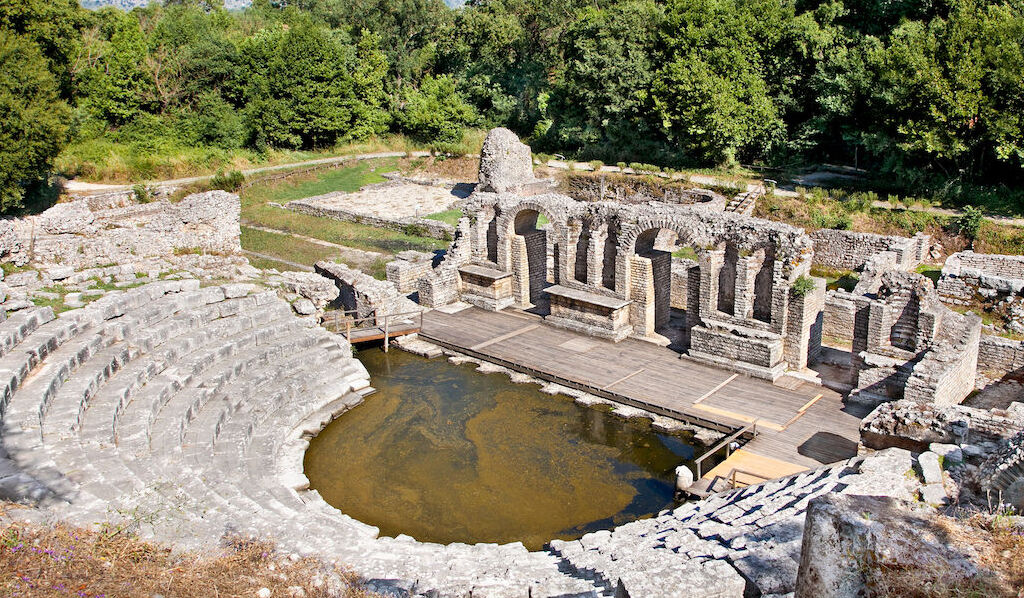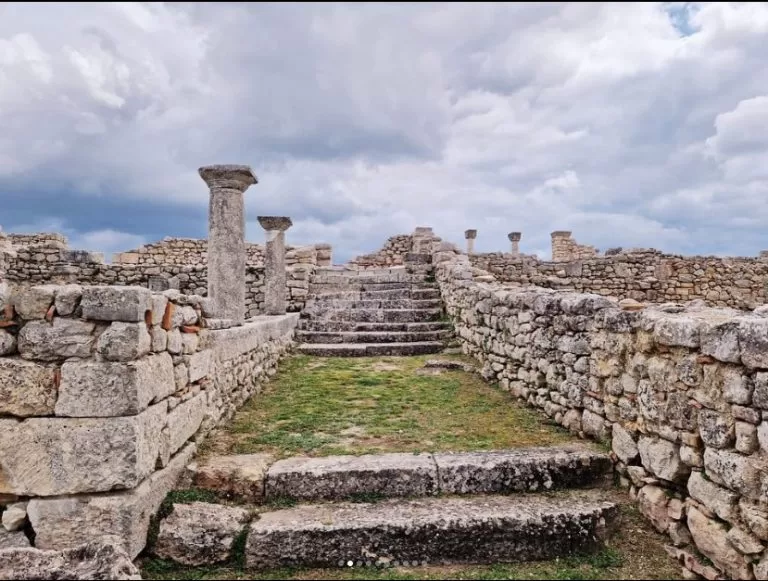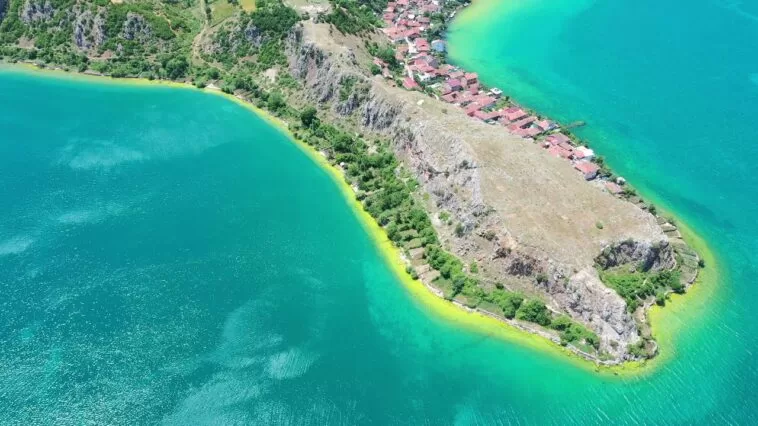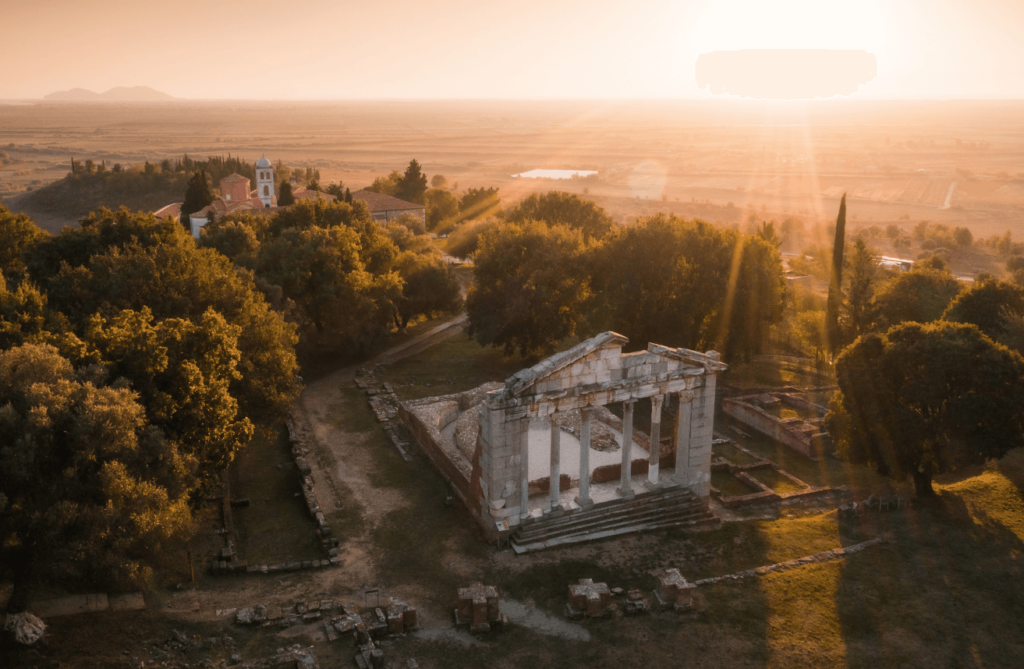Butrint, the Magic of Archaeology and the Microcosm of the Mediterranean

The Butrint National Park is one of the most important archaeological areas of cultural and tourist heritage in our country and the Mediterranean region. It is located in southern Albania and is bordered to the north by the villages of Berdenesh – Kallmit –Qenuri in the Vurg area; to the east by the villages Qenuri-Xarrë, passing through the ridge of Mount Milesë; to the south by the villages Xarrë – Shëndëlli – Vrinë, up to Stillo cape; while to the west through the road from Berdenesh including the Ksamil islands, it extends to the state border with Greece.
At the heart of the park is the ancient city of Butrint, where history and nature intertwine, making Butrint one of the most visited archaeological sites every season by researchers, foreign tourists, and local visitors.
Butrint is described as a microcosm of Albania’s history. From its strategic location, Butrint starts in the history of the Mediterranean, from the first Peloponnesian War in the 5th century BC. Its monuments built during different historical periods reflect this long and complex history. Ancient Buthrotum is located near the southern city of Saranda and extends about 3 km from the Corfu strait, situated on a small hill, surrounded by the waters of Lake Butrint, which connect to the Ionian Sea through the Vivari Channel.
Today, the numerous archaeological ruins of Butrint testify to its rich past. A stone axe and a shaft, belonging to the second half of the second millennium BC, are the oldest objects excavated in the archaeological area.
Butrint has been part of the written records since the 6th century BC when the ancient Greek historian Hecataeus first mentioned the city in his work, writing that Butrint was designed according to Troy. According to Hecataeus, the original name of Butrint, Buthrotos, refers to the bull sacrificed by the Trojan prince Aeneas on his way to Dodona. In the early period of its history, Butrint was an area of the Kaonian tribes, which would later be included in the kingdom of Epirus.
The first thorough excavation of Butrint and the surrounding area was led by Italian archaeologist Luigi Ugolini between 1926 and 1936. Focusing on Butrint and the nearby Greek settlement of Finiq, Ugolini discovered a true treasure; a baptistery, a theater, a basilica, public baths, a gymnasium, gates, castle walls, a temple dedicated to Minerva, as well as a considerable number of houses, objects that testify to its fertile history.
The Greek and Roman roots of Butrint are evident in the extraordinary objects found around the amphitheater: a statue of Apollo, another of the goddess of Butrint, a portrait of Agrippa, heads of Zeus and Livia, among many Latin and Greek epigraphs.
Several towers built during the period when the Venetians controlled the entrance to this area still stand. Nearby, visitors can also explore the triangular fortress of Vivari, built by Ali Pasha Tepelena, the Albanian ruler, in the early 1800s.
In 1992, Butrint was accepted as Albania’s first archaeological settlement on the UNESCO World Heritage List. In 2000, Butrint was declared a National Park under state protection, and UNESCO officially expanded its area from the previous 20 ha to 29 km². The designation as a National Park was made to protect and conserve the historical monuments and rich environmental heritage.
Customise your Albanian tour now!
Other Destinations
Bylis Archaeological Park

Bylis, the ancient Illyrian settlement that fascinates you with its landscapes
Bylisi is one of the most important archaeological centers of Albania and is often visited by tourists, for the unusual landscape that surrounds it and the monuments found there.
This park represents the ruins of an old Illyrian civilization, called Ballaite. Bylis is located on the plateau of a hill near the village of Hekal, in the area of Mallakastra, from where you can see a good part of the territory of Albania, the shores of the Adriatic, the Field of Myzeqe and the mountain of Tomorri.
In the ancient city of Bylis, the ruins of the theater with a capacity of 7,500 spectators are preserved, which served not only for various theatrical and musical performances for the residents of the city and the surrounding areas, but also as a meeting place where important decisions were made about the fate of the Bylis community.
In addition to the theater, the city had its own stadium, two promenades, one of which was two-story, the water reservoir, the prytaneon, the gymnasium, altars, houses, roads, as well as its own workshops of pottery, construction, sculpture, metalworking, and the workshop of cutting own currencies.
Lini, the Early European Settlement on the Shores of Lake Ohrid

The Archaeological Park of Apollonia – The Enchanting Monument Where Emperor Octavian Studied

The ancient city of Apollonia is located in southwestern Albania, 12 kilometers away from the city of Fier and the shores of the Vjosa River, or Aous as known in early writings. Apollonia is situated on a hilly plateau from where the fertile plain of Myzeqe stretches to the Adriatic Sea, with the hills of Mallakastër visible in the distance. The ruins of Apollonia were discovered in the early 19th century.
The enchanting landscape of the archaeological park has been exceptionally well-preserved. Here, natural monuments intertwine with an attractive horizon, offering an oasis for relaxation and contemplation.
As a city, Apollonia was founded at the beginning of the 7th century BC by Greek colonizers from Corinth and quickly became one of the most prominent cities in the Adriatic basin, mentioned more often than the other thirty cities of the same name in antiquity. The city extended over the territory of the political community of the Taulantii and was widely known as Apollonia of Illyria. The earliest evidence of their presence dates back to around 588 BC.
The city was named in honor of the god Apollo. Apollonia’s fame attracted many notable personalities from the greatest empire of the ancient world, including the renowned Roman philosopher and orator Cicero, who marked Apollonia in his work, “Philippics” as magna urbs et gravis (a great and important city). During this period, the city became one of the most important ports on the trans-Balkan route, Via Egnatia. The city’s famous Academy was where the Roman emperor Octavian, accompanied by Agrippa, a distinguished general and statesman of the Roman Empire, studied and underwent military training.
Studies estimate that the city had about 60,000 inhabitants, a record number for the period of Antiquity. Archaeologists call Apollonia the Pompeii of Albania, as only 10% of the former city’s territory has been uncovered to date.
Visitors to the Archaeological Park of Apollonia find interest in the Monument of Agonothetes, the Odeon, the Library, the surrounding wall, the Portico, the villa with impluvium, the Roman villa with mosaics, the archaeological museum, the old Monastery of Saint Mary, dating back to the 13th century, and the Byzantine Church of the Mother of God, built near the monastery’s garden, dating from the 14th century, among others.
Apollonia is one of the wonders of cultural tourism in Albania. It is easily accessible due to its location near major Albanian cities and the beautiful beaches of the Ionian Riviera.
Antigonea, the Capital of Ancient Civilization Above the Drino Valley

The ancient city of Apollonia is located in southwestern Albania, 12 kilometers away from the city of Fier and the shores of the Vjosa River, or Aous as known in early writings. Apollonia is situated on a hilly plateau from where the fertile plain of Myzeqe stretches to the Adriatic Sea, with the hills of Mallakastër visible in the distance. The ruins of Apollonia were discovered in the early 19th century.
The enchanting landscape of the archaeological park has been exceptionally well-preserved. Here, natural monuments intertwine with an attractive horizon, offering an oasis for relaxation and contemplation.
As a city, Apollonia was founded at the beginning of the 7th century BC by Greek colonizers from Corinth and quickly became one of the most prominent cities in the Adriatic basin, mentioned more often than the other thirty cities of the same name in antiquity. The city extended over the territory of the political community of the Taulantii and was widely known as Apollonia of Illyria. The earliest evidence of their presence dates back to around 588 BC.
The city was named in honor of the god Apollo. Apollonia’s fame attracted many notable personalities from the greatest empire of the ancient world, including the renowned Roman philosopher and orator Cicero, who marked Apollonia in his work, “Philippics” as magna urbs et gravis (a great and important city). During this period, the city became one of the most important ports on the trans-Balkan route, Via Egnatia. The city’s famous Academy was where the Roman emperor Octavian, accompanied by Agrippa, a distinguished general and statesman of the Roman Empire, studied and underwent military training.
Studies estimate that the city had about 60,000 inhabitants, a record number for the period of Antiquity. Archaeologists call Apollonia the Pompeii of Albania, as only 10% of the former city’s territory has been uncovered to date.
Visitors to the Archaeological Park of Apollonia find interest in the Monument of Agonothetes, the Odeon, the Library, the surrounding wall, the Portico, the villa with impluvium, the Roman villa with mosaics, the archaeological museum, the old Monastery of Saint Mary, dating back to the 13th century, and the Byzantine Church of the Mother of God, built near the monastery’s garden, dating from the 14th century, among others.
Apollonia is one of the wonders of cultural tourism in Albania. It is easily accessible due to its location near major Albanian cities and the beautiful beaches of the Ionian Riviera.
Customise your Albanian tour now!
Other Destinations
Get in touch with our friendly team
- contact@absolutealbania.com
- +355 67 40 567 56
